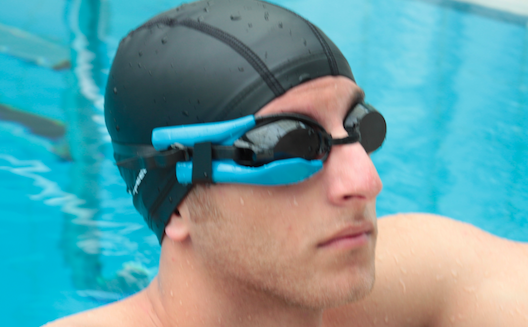The Arab World's Hottest Hardware Startup this Year? Instabeat Raises $11K in 5 Days


Swimmers, says Lebanese entrepreneur Hind Hobeika, have it tough
when it comes to technology. To measure their performance, they’ve
been fumbling along with devices created for running. “The motion
of the arms and the head makes it impossible for swimmers to read
values off a watch throughout the workout, and adds friction to the
motion of the swimmer,” she points out.
Hobeika, a competitive swimmer turned hardware engineer, has set
out to transform the experience, crafting her dream performance
tracker: Instabeat, a device that seamlessly tracks a swimmer’s
heart rate, caloric burn, and number of laps. Her first prototype,
which is designed to easily fit any pair of swimming goggles, is
now available via an IndieGoGo campaign that launched last week.
After regularly testing the model (formerly called Butterfleye)
on five professional swimmers, Hobeika and her team of five
engineers were able to hone the design, from an initial model that
projected screens onto both goggles, to a sleek model that alerts
the swimmer with LED lights in the corner of their right goggle as
to whether they are performing in fat burning (blue), mid-range
(green), or maximum (red) zones.
A new waterproof USB design that will allow the device to upload
stored data, and the team has optimized the device’s ability to
read a swimmer’s pulse from the temporal artery, using a light
sensor. “Between individuals, the artery’s location varies by less
than 5mm, which is covered by the light sensor’s 30 degree angle of
detection,” explains Hobeika, who holds a degree in mechanical
engineering from the American University in Beirut.
The current prototype is now selling like hotcakes. 100 of the
“Limited Edition” prototypes offered for $99 have already been
claimed; those who want one now will have to pay $139. Since it
went live on Thursday, Instabeat has reached almost $11,500 of its
$35,000 goal (this number includes donations made via a separate
payment gateway for those in Lebanon).
The team is “freaking out” that the campaign is doing so well, she
admits. But, never one to believe the hype, she’s immediately
focusing on the next steps. “I'm trying to focus on the campaign so
they can go hard core on the product right now. This is a good
milestone, but it shouldn't distract us from the real work,” she
says cheerily.
Pioneering world-class hardware in Lebanon
Instabeat’s launch is a moment the Middle East has been waiting
for; ever since Hobeika won third place in the Stars of Science
competition in 2010 and first in the MIT Arab Business Plan Competition
last year, she been one of the most promising entrepreneurs to
watch in the Middle East, period.
Only 24, Hobeika can often be seen with a bright smile on her face,
making a punishing work ethic seem effortless. On her personal website, she writes,
“Up until 2010, my life had been pretty standard. I was always
first in school, knew I wanted to become an engineer, and dreamt
about working in a supermultinational, leading the ambitious
corporate life.” Her dedication to her startup is directly
informed by her love of exercise and self-quantification. “My day usually starts
with an hour of running followed by 3km of swimming,” she
notes.
Her work ethic has helped her persevere in the tough environment of
Lebanon, where “the resources for prototyping are non-existent,”
she says.
For instance, simply using a 3D printer has proved difficult.
Access to a local high end 3D printer would have allowed the team
to print new designs in 20 minutes (local co-working space Lamba
Labs has one, but it’s too basic- “we’re far beyond simply
testing the shape," says Hobeika). Instead, by ordering designs
printed in Europe and shipped to Beirut, the Instabeat team was
able to iterate on a time scale of 10 days.
And yet, less than a year and a half after the company’s
official launch in December 2011, they've produced a prototype
quickly, funded by $100,000 in seed investment from local incubator
Berytech and the $50,000 she won from MIT.
Bringing innovation to market
Now, Hobeika says, “The easy part is done. The much harder part
is coming.” The team is ironing out their manufacturing process,
planning to use facilities in Korea and China to manufacture the
plastics, and companies in Ireland and France to build the
electronics. Assembly might take place in Asia, she says.
Of the lucky few who manage to get their hands on this first
prototype, 50 will be asked to become testers, swimming with it
daily and keeping a personal log. “It’s an intensive logging
activity, but they will be compensated,” she explains.
The team is already at work on the next prototype, which will
offer wireless battery charging, bluetooth syncing, and more
sophisticated analytics, with a dashboard where coaches can monitor
their swimmers in real time. If Hobeika gets her wish, the device
will enable millions of swimmers to better understand the sport
they love.
Watch more in her TED Talk below:


